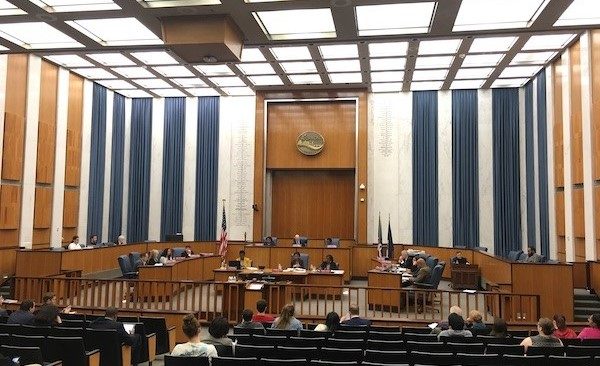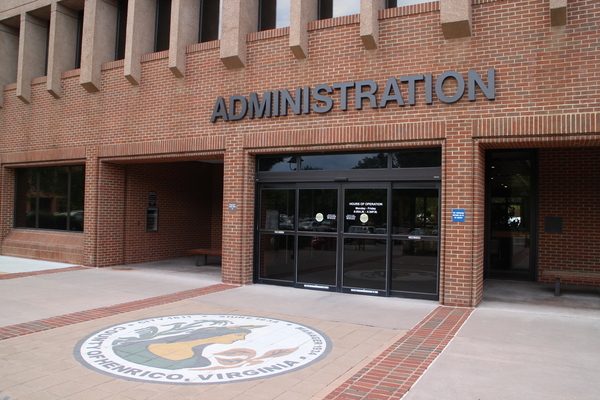
Richmond City Council will allow maximum loans of $20,000 or six months of employees’ wages to help the city’s for-profit businesses cover payroll. (BizSense file photo)
The Richmond Economic Development Authority signed off Thursday on creation of a $1 million loan program aimed at small businesses struggling with the effects of the coronavirus pandemic.
It’s the latest of a handful of new programs and initiatives local governments have rolled out in recent weeks to help businesses during the sudden downturn.
Many of the programs officials have focused on are in the hospitality industry, as hotels, caterers and restaurants have especially endured reduced revenue from the pandemic.
Efforts have ranged from loans to tax relief and online resources intended to drum up business for restaurants. Officials said more support efforts could go into effect, though it depends on federal and state relief measures, and how the pandemic plays out. Localities also have worked to publicize federal and state resources available to businesses.
Richmond’s program, approved in a special EDA meeting Thursday and dubbed the Richmond Small Business Disaster Loan Program (COVID-19), allows maximum loans of $20,000 or six months of employees’ wages, whichever is less, to help the city’s for-profit businesses cover payroll. Fund allocations will be made in monthly installments. Payment of the one-time, zero-interest emergency loans would be deferred for six months, said Leonard Sledge, the city’s EDA director.
The EDA allocated $1 million out of its unrestricted funds to power the program. Businesses have to go through an application process that city staff will vet and approve on a first-come, first-served basis. The city is expected to begin reviewing applications April 6.
The mayor’s office also stated in a mid-March announcement its intention to introduce an amnesty program on penalties and interest on “most” local taxes for City Council’s consideration. That has yet to happen.
Henrico takes steps
Henrico County has gone the furthest in tax relief among local municipalities. The county won’t charge businesses penalties or interest on meals and hotel tax payments through August. Henrico County also decided to hit pause on penalties and interest on commercial real estate, personal property, and machinery and tools taxes, for a 60-day period after the June 5 due date.
Anthony Romanello, executive director of Henrico’s EDA, said in a statement that such measures, which the county Board of Supervisors approved last week, are intended to keep local businesses viable during the disruptions caused by the coronavirus.
Henrico also kicked off a meal-buying program in which the county covers the cost of meals purchased at local restaurants by its public safety and other essential employees.
The program, which launched March 28, provides lunch or dinner for county employees on the clock during the pandemic and supports mom-and-pop restaurants, said Cari Tretina, chief of staff to the county manager.
About 50 restaurants are involved. The county is paying for the program out of funds that were allocated to county initiatives that have been disrupted by the virus, such as sporting events, Tretina said.
“This unprecedented time called for unprecedented efforts by local government,” she said.
Hanover supervisors voted March 25 to waive penalty and interest on transient occupancy taxes and utilities for a 60-day period. County staff launched an interactive map on the economic development department website that details the list of restaurants that offer takeout and delivery.
Linwood Thomas, director of Hanover Economic Development, said website visits have gone up considerably and the map is a popular destination for visitors. He said he hoped the map was translating into more revenue for county restaurants.
In Chesterfield, the county’s Board of Supervisors approved a freeze on penalties and interest on transient occupancy taxes and utilities on March 25. The program is set to expire 30 days after the conclusion of the declared state emergency.
County staff are looking into other ways to provide assistance, which could include more changes to tax collection, said Garrett Hart, director, Chesterfield Economic Development.
Chesterfield also has launched an online map that shows restaurants in the county that are offering pickup or delivery. The county wants to encourage residents to order from local restaurants once a week.

Richmond City Council will allow maximum loans of $20,000 or six months of employees’ wages to help the city’s for-profit businesses cover payroll. (BizSense file photo)
The Richmond Economic Development Authority signed off Thursday on creation of a $1 million loan program aimed at small businesses struggling with the effects of the coronavirus pandemic.
It’s the latest of a handful of new programs and initiatives local governments have rolled out in recent weeks to help businesses during the sudden downturn.
Many of the programs officials have focused on are in the hospitality industry, as hotels, caterers and restaurants have especially endured reduced revenue from the pandemic.
Efforts have ranged from loans to tax relief and online resources intended to drum up business for restaurants. Officials said more support efforts could go into effect, though it depends on federal and state relief measures, and how the pandemic plays out. Localities also have worked to publicize federal and state resources available to businesses.
Richmond’s program, approved in a special EDA meeting Thursday and dubbed the Richmond Small Business Disaster Loan Program (COVID-19), allows maximum loans of $20,000 or six months of employees’ wages, whichever is less, to help the city’s for-profit businesses cover payroll. Fund allocations will be made in monthly installments. Payment of the one-time, zero-interest emergency loans would be deferred for six months, said Leonard Sledge, the city’s EDA director.
The EDA allocated $1 million out of its unrestricted funds to power the program. Businesses have to go through an application process that city staff will vet and approve on a first-come, first-served basis. The city is expected to begin reviewing applications April 6.
The mayor’s office also stated in a mid-March announcement its intention to introduce an amnesty program on penalties and interest on “most” local taxes for City Council’s consideration. That has yet to happen.
Henrico takes steps
Henrico County has gone the furthest in tax relief among local municipalities. The county won’t charge businesses penalties or interest on meals and hotel tax payments through August. Henrico County also decided to hit pause on penalties and interest on commercial real estate, personal property, and machinery and tools taxes, for a 60-day period after the June 5 due date.
Anthony Romanello, executive director of Henrico’s EDA, said in a statement that such measures, which the county Board of Supervisors approved last week, are intended to keep local businesses viable during the disruptions caused by the coronavirus.
Henrico also kicked off a meal-buying program in which the county covers the cost of meals purchased at local restaurants by its public safety and other essential employees.
The program, which launched March 28, provides lunch or dinner for county employees on the clock during the pandemic and supports mom-and-pop restaurants, said Cari Tretina, chief of staff to the county manager.
About 50 restaurants are involved. The county is paying for the program out of funds that were allocated to county initiatives that have been disrupted by the virus, such as sporting events, Tretina said.
“This unprecedented time called for unprecedented efforts by local government,” she said.
Hanover supervisors voted March 25 to waive penalty and interest on transient occupancy taxes and utilities for a 60-day period. County staff launched an interactive map on the economic development department website that details the list of restaurants that offer takeout and delivery.
Linwood Thomas, director of Hanover Economic Development, said website visits have gone up considerably and the map is a popular destination for visitors. He said he hoped the map was translating into more revenue for county restaurants.
In Chesterfield, the county’s Board of Supervisors approved a freeze on penalties and interest on transient occupancy taxes and utilities on March 25. The program is set to expire 30 days after the conclusion of the declared state emergency.
County staff are looking into other ways to provide assistance, which could include more changes to tax collection, said Garrett Hart, director, Chesterfield Economic Development.
Chesterfield also has launched an online map that shows restaurants in the county that are offering pickup or delivery. The county wants to encourage residents to order from local restaurants once a week.


The City, counties and frankly the entire state of Virginia should declare “all” taxes and utilities in amnesty for the months this covid crisis occurs. What’s the incentive to reopen presumably in June? So businesses can get hit with a huge tax and utility bill once they reopen. What’s the incentive to our politicians to allow people to go back to work? The public safety excuse can be used indefinitely. It’s like getting into a lopsided contract with no end date. And the solution to these problems is Forbearance? Get into more debt in an already dried up credit market?… Read more »